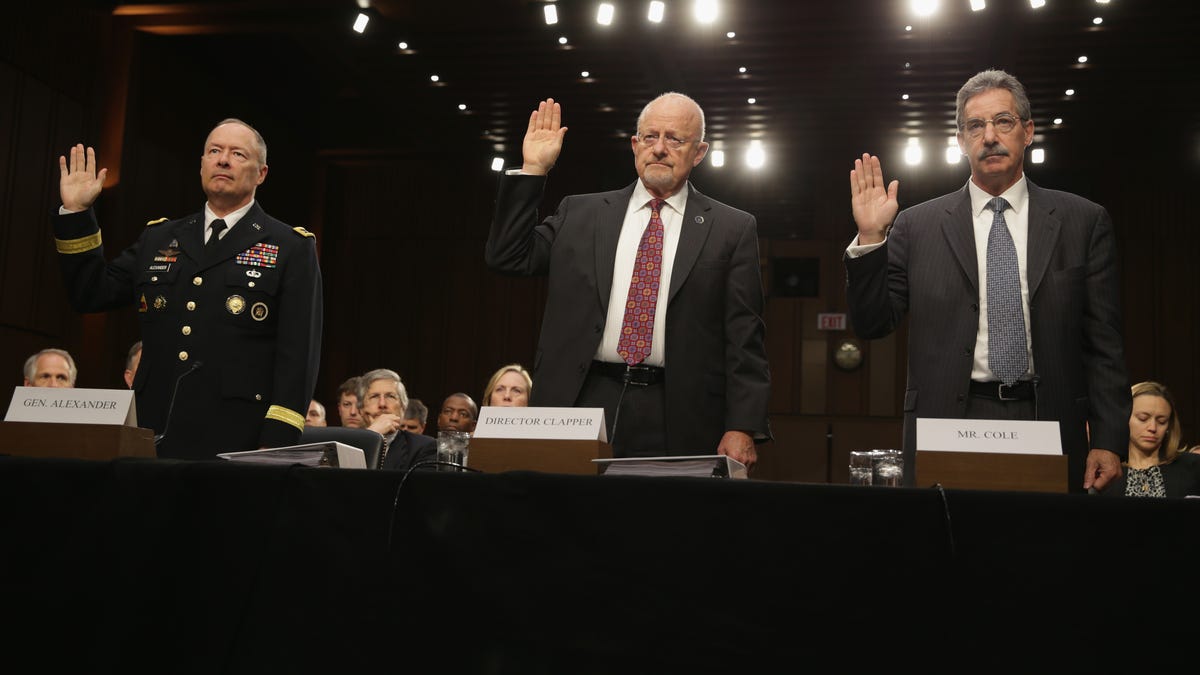NSA ran secret test on tracking Americans' cell phones
Test was meant to suss how National Security Agency's systems could handle bulk location data, according to Director of National Intelligence James Clapper and NSA head Keith Alexander.

Lose your cell phone? Well, you can't expect the NSA to help you find it. Or can you?
In the latest revelation kicked up by the privacy brouhaha surrounding leaks by former NSA contractor Edward Snowden, it's come to light that the US National Security Agency tested its systems' ability to handle bulk data on the location of Americans' cell phones (and thus oftentimes, of course, on the location of Americans themselves).
The information comes not from the Snowden documents, but from an answer written out by Director of National Security James Clapper in preparation for potential questions at Wednesday's Senate Judiciary Committee hearing on the NSA and the Foreign Intelligence Surveillance Act. The New York Times obtained a copy of the text prior to the hearing, and NSA Director Keith Alexander subsequently delivered at least some of the remarks at the event, according to blog Politico.
Clapper's draft answer says that "In 2010 and 2011 NSA received samples [of location data] in order to test the ability of its systems to handle the data format, but that data was not used for any other purpose and was never available for intelligence analysis purposes." The answer goes on to say that the NSA has promised to seek an OK from the FISA court --which is meant to oversee the agency -- and to notify Congress before any future collection of location data under Section 215 of the Patriot Act.
It's not clear how many Americans' location data was used during the test or whether the NSA has kept that info, the Times reports.
Clapper recently declassified info on the test program's existence, the Times says, but the program hadn't yet been disclosed to the public. And the public still may not be getting all the details.
Sen. Ron Wyden (D-Ore.), who's privy to classified info as a member of the Senate Intelligence Committee and has been critical of domestic surveillance programs, said in a statement Wednesday that "once again, the intelligence leadership has decided to leave most of the real story secret -- even when the truth would not compromise national security," the Times reports.
After Alexander made his remarks regarding the test during the hearing, the NSA chief added, according to Politico, that "this may be something that is a future requirement for the country."
The legality of tracking cell phone location data without a warrant is up in the air. The NSA justified its test under Section 215 of the Patriot Act, which lets the agency demand, without a warrant, records from phone companies and other businesses provided the records are "relevant" to its investigations. As for other agencies, however, rulings on warrantless cell-location tracking have gone both ways, and the Supreme Court has yet to weigh in (though some say a ruling by the court last year that nixed GPS tracking suggests cell tracking should be off limits as well).
The American Civil Liberties Union took advantage of the news of the NSA's location-tracking test to bring up the larger issue: "The NSA's attempt to collect this data shows the need for stronger legislative oversight of the agency's activities, but the fact is that federal, state, and local law enforcement are already regularly collecting cell phone location information without a warrant," the group said in a statement. "Last year a majority of the Supreme Court recognized that location information is sensitive, and we need legislation that respects privacy rights when it comes to Americans' movements."
A Senate split
Politico also noted that during the Wednesday hearing, senators were divided on whether another NSA program, the agency's bulk collection of phone-call metadata (what number called what number, how long calls lasted, and so on) should continue.
Senate Intelligence Committee Chairwoman Dianne Feinstein (D-Calif.) defended the program, referring to the September 11, 2001, attacks on the World Trade Center and the Pentagon:
"The event happened and it was catastrophic for people, for this nation, for our standing, but most important for the death and destruction," Feinstein reportedly said. "I believe that if this were to happen again with this program and other programs working in combination, we have an opportunity to pick that up. In the absence of these kinds of technological programs, we do not have an opportunity to pick that up."
Whereas Senate Judiciary Committee Chairman Patrick Leahy (D-Vt.) reportedly said, "I think it's time for a change. The government has not made its case that bulk collection of domestic phone records is an effective counterterrorism tool, especially in light of the intrusion on American privacy."
At the hearing, Alexander also denied a New York Times report that said the NSA had searched social networks of Americans, according to The Washington Post.Update, 12:19 p.m. PT: Adds info on Alexander's denial of Times report regarding social networks.
Update, 1:28 p.m. PT: Adds info on legal issues around warrantless location tracking.

